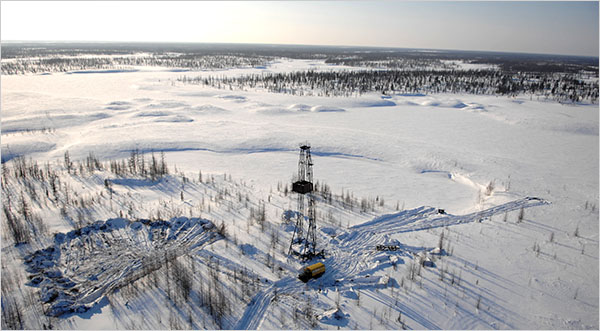
Gazprom’s Gas Price Shell Game
Publication: Eurasia Daily Monitor Volume: 6 Issue: 4
By:

How does Russia’s Gazprom set the price for the gas it sells its customers in the former Soviet republics and the EU? Few, if any, managers in Gazprom can answer this question with any measure of certainty. The formula for calculating this seemingly capricious price, if there is such a formula, remains a highly confidential “commercial secret” closely guarded by Gazprom and its customers. For years, opacity, secrecy, and backroom deals seem to have been the main factors used to establish the price for Russian gas.
During the current “gas war” between Ukraine and Gazprom, Gazprom managers and Russian Prime Minister Vladimir Putin have managed to quote four different prices for gas in less than a month ranging from $250 to $450 for 1,000 cubic meters (tcm). Gazprom has been playing fast and furious with numbers while accusing the Ukrainian buyers of “stealing gas” without offering a shred of hard evidence that this theft actually took place.
In December Alexei Miller, the CEO of Gazprom, announced that beginning in January 2009, Ukraine would pay $450 per tcm of Russian gas. During the December negotiations between Ukraine and Russia, the Russians set the price at $250, a difference of $200 from what Miller initially stated. How was this possible? Did the price of oil, which is indexed to the price of gas, suddenly drop in a few days to warrant this change? The oil price did indeed go into free fall in the second half of 2008, but the indexing lags six to seven months before it has an impact on gas prices.
Miller, it appears, was talking on behalf of his alter-ego, Vladimir Putin, who at that time had decided to punish the Ukrainians for various pro-Western political sins. Putin quoted the absurd price of $450, thereby showing that he was not fully versed in gas price formation.
Putin kept juggling his figures. On January 2 Itar-Tass reported that Russia had updated its contract to purchase gas from Turkmenistan “at world prices” and would now pay $340 per tcm. “If transit prices are added to this price, the price of gas for Ukraine will be $380 per one thousand cubic meters,” the prime minister said, a far cry from the $450 he had quoted a day earlier.
When the Ukrainian side rejected the $250 price, Miller weighed in again and stated that since Ukraine had rejected a reasonable offer (one that had little in common with the wellhead price for gas in Russia), it would now be forced to pay $418. A few days later Miller (possibly on instructions from Putin), with no market justification for his actions, raised the price by $32, back to $450.
According to Gazprom spokesmen, the average price for Russian gas in the fourth quarter of 2008 for EU countries was $460 to $520 per tcm (Kommersant, November 11, 2008). Yet, the former Ukrainian deputy foreign minister responsible for energy negotiations with Russia, Oleksandr Chaliy, told the BBC’s Ukrainian Service on January 6 that German companies buying gas from Russia had paid $290 per tcm in 2008. Why were they getting such a deal? Which countries in the EU were paying the alleged price of more than $500 for Russian gas in 2008?
The answer is unknown because of Gazprom’s non-transparent pricing policy, the use of murky intermediaries, and the self inflicted silence of its customers who refuse to disclose at what price and for what political payback they purchase Russian gas.
One possible explanation for the chaos in Russian gas prices might be that the Russian government headed by Vladimir Putin and Russia President Dmitry Medvedev are co-conspirators in a criminal scheme to defraud European consumers. By first artificially raising gas prices and then attempting to raise prices even higher by cutting off most gas deliveries in the middle of a freezing winter, their hope might be to create a panic-driven market in which spot prices for Russian gas would go through the roof.
Can such tactics be prevented? The first step should be to legally require all energy companies to publish the price they pay for gas and the terms of the purchase contracts. A breath of fresh air in the gas business would help prevent situations like the January 2009 gas cutoff from reoccurring.
Gazprom and most other gas companies are infamous for hiding the terms under which they sell their product to different companies. The practice of calling the terms of almost any transaction a “commercial secret” is more often than not a vehicle for bestowing favors on certain countries or key individuals in return for their support. It goes this way: We give you a better price for gas; you give us your souls.




